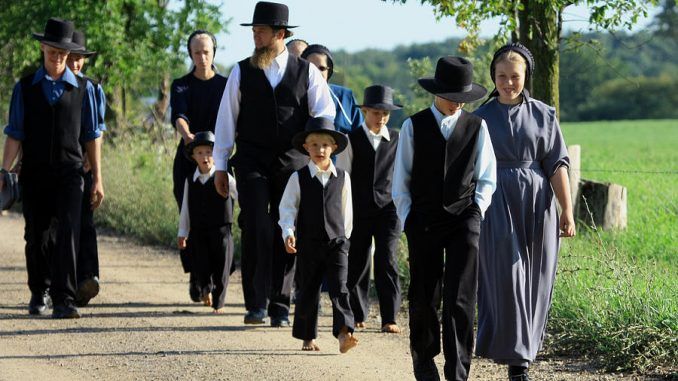
Scientists claim that autism has been around for over 1,000 years and has remained consistently as prevalent as it is in today’s world – with 1 in every 166 in the U.S. being born with autism.
However, within the Amish community autism does not exist. Why is this? It looks like the answer to this question leads to a much bigger revelation about the cause of autism itself.
Since they have been cut off for hundreds of years from American culture and scientific progress, the Amish may have had less exposure to some new factor triggering autism in the rest of population. The likely culprit: vaccines.

BYPASS THE CENSORS
Sign up to get unfiltered news delivered straight to your inbox.
You can unsubscribe any time. By subscribing you agree to our Terms of Use
Traveling to the heart of Pennsylvania Dutch country in search of autistic Amish children, the reporter, based on national statistics, should have found as many as 200 children with autism in the community — instead, he found only three, the oldest age 9 or 10:
The first autistic Amish child was a girl who had been brought over from China, adopted by one family only to be given up after becoming overwhelmed by her autism, and then re-adopted by an Amish Mennonite family. (China, India and Indonesia are among countries moving fast to mass-vaccination programs.)
The second autistic Amish child definitely had received a vaccination and developed autism shortly thereafter.
The reporter was unable to determine the vaccination status of the third child.
Dangerous Effects of Thimerosal
In some vaccines, they use a mercury-based preservative called thimerosal that keeps multiple-dose vials from becoming contaminated by repeated needle sticks. After health officials became concerned about the amount of mercury infants and children were receiving through thimerosal-tainted vaccines, the toxin was phased out of U.S. vaccines starting in 1999.
However, due to mislabeling and other problems, its presence is still being felt, and more and more children are suffering because of it.
Does anyone out there really need more evidence than this?
Admittedly, this was not a placebo-controlled scientific trial but an evidence-based fact analysis that, in my mind, provides an irrefutable link to a lifestyle and, most likely, mercury-containing vaccine connection to autism.
Folks, you don’t have to be a medical doctor, hold advanced epidemiology degrees or teach molecular genetics to figure this one out. You don’t even need a degree in rocket science. How much more obvious could it be?
The link between autism and vaccines is certainly not a new idea. In fact, suggestions of this link have been in the national news for at least six years now. Just last year a study, that reviewed data from the Centers for Disease Control and Prevention’s (CDC) Vaccine Data Link, concluded that children who receive thimerosal-containing vaccinations are 27 times more likely to develop autism than children who do not.
That’s a 2,700 percent increase. The numbers just don’t lie.
This most recent investigation simply provides the proverbial icing on the cake. There aren’t too many other places, if any, in America where you can find large groups of children who haven’t been vaccinated.
The reporter found three children with autism. One child was adopted and previously vaccinated, another was one of the few Amish children who were vaccinated, and the third had an unclear vaccine history. That leaves, at most, potentially one child out of an expected 200 (from national statistics) with autism. The odds of this being mere coincidence are slim to none.
At Least Change the Rules Concerning the Hepatitis B Vaccine
Because of their religious beliefs, the Amish community chooses not to give their children any vaccines. Understandably, many of you may not choose such a radical approach. However, if you were to focus on just one vaccine, I would encourage you to look at the issues surrounding the hepatitis B vaccine.
The multi-dose version of this vaccine, which is typically administered to newborns before they leave the hospital, still contains thimerosal. This is reprehensible, irresponsible negligence of the highest magnitude. The immature central nervous systems of these helpless newborns are particularly susceptible to toxic insults, and thimerosal, the mercury-containing preservative used in these vaccines, is one of the worst.
It would be much easier to understand if the hepatitis B vaccine had some value, but most natural health experts who study this are convinced that this is nearly always an absolutely unnecessary vaccine.
There are only about 5,000 people a year who develop the most serious consequence of hepatitis B infection, liver cancer. That means we are immunizing tens of millions of infants and causing brain injury that has caused an epidemic of autism to protect liver cancer in 5,000 adults. And, many of these adults have serious social problems like IV drug abuse, alcoholism and poor nutrition that seriously increases their risk for this disease.
If you’re a young parent weighing the pros and cons of vaccines, I strongly urge you to learn more about the toxicity of thimerosal, which, again, is still present in multi-dose hepatitis B vaccines, and nearly all the mandated flu vaccine for infants.
This article was originally published in 2015 and is frequently updated


